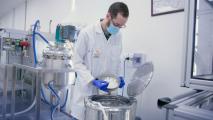
Biotech
Human history has been all but defined by death and disease, plague and pandemic. Advancements in 20th century medicine changed all of that. Now advancements in 21st century medicine promise to go even further. Could we bring about an end to disease? Reverse aging? Give hearing to the deaf and sight to the blind? The answer may be yes. And soon.
More
Surgeons can now practice on a 3D-printed copy of your liver
A new technique for creating life-like 3D-printed livers based on individual patients’ scans could help surgeons be better prepared for operations.
We may have a new ally in the fight against dengue fever
A large trial has provided the best evidence yet that infecting mosquitoes with Wolbachia can help reduce dengue infections.
Many amputees couldn’t afford a bionic arm — until now
Indian startup Makers Hive has developed a bionic arm that’s not only 90% cheaper than most, but also more functional.
Beer hops could hold key to preventing common liver disease
Compounds derived from hops might be able to help prevent — or even treat — nonalcoholic fatty liver disease (NAFLD) in people.
A virus "chimera" reveals new dengue targets
Using a flavivirus that only infects insects, Australian researchers can safely study more dangerous viruses.
Two opposite kinds of stroke. One promising treatment.
A new stroke treatment could give doctors a way to help victims sooner, improving their chances of avoiding permanent brain damage.
3D-printed liver tissue may be first step to lab-grown organs
A NASA challenge designed to accelerate tissue engineering has announced two winning teams, both of which used 3D bioprinting to create human liver tissue.
Google and Harvard have created the most detailed brain map yet
Google and Harvard have released the most detailed map yet, called a connectome, of a section of the human brain.
Neck-zapping device helps sleep-deprived soldiers think
A handheld device that delivers vagus nerve stimulation was shown to combat the effect of sleep deprivation in soldiers.
Did the flu lose diversity during the pandemic?
After a record-low flu season, an entire clade of flu may be gone. If so, making vaccines may have become easier.
Hope and controversy: FDA approves first new Alzheimer's drug in decades
The FDA has approved the first new Alzheimer’s drug in decades, but the decision brings not only hope, but controversy.
Blood test can quickly tell if a targeted cancer therapy works
The ExoSCOPE blood test can determine with 95% accuracy whether a targeted cancer therapy is working within 24 hours of administration.
Want strong teeth? Eat this candy.
Researchers claim to have invented an experimental breath mint that may renew tooth enamel and strengthen teeth, and it’s already headed into human trials.
Series|
Just Might Work
Can we hack sugar to be healthy?
Is there such a thing as healthy sugar? Food scientists in Israel are hacking the sugar molecule itself – eliminating the need for subpar alternatives.
Disease-resistant banana created with CRISPR
African scientists have used CRISPR to create a disease-resistant banana that is indistinguishable from unmodified plants.
Microscopic animals revived after 24,000 years in permafrost
A multicellular animal called the bdelloid rotifer has used cryptobiosis to survive in the Siberian permafrost for at least 24,000 years.
Moderna COVID-19 vaccine 2.0: Lower dose, fewer side effects
Any revised version of the Moderna COVID-19 vaccine will likely include a smaller dose, reducing side effects and increasing the supply of shots.
Editing one gene extends mouse life expectancy by 23%
By modifying just one gene, researchers were able to extend the life expectancy of mice by 23%, and they think their results may translate to humans.
Can a dog vaccine for Valley fever lead to a human one?
Cases of Valley fever, a fungal infection, have risen dramatically over the decade. Researchers hope a dog vaccine may lead to one for humans.
A small dose of an ibogaine-like drug cures stress in mice
A novel drug designed like ibogaine but without the ibogaine trip or toxicity has corrected the effects of stress in mice.
Subscribe to the newsletter































